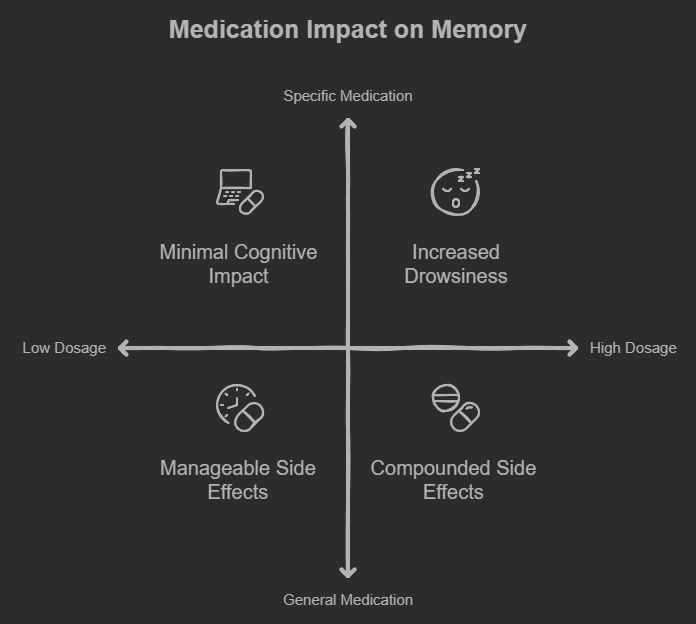How to Restore Memory Loss After Seizure?

Epilepsy can really mess with your memory. It makes it hard to remember words, facts, and events.
This condition affects both short-term and long-term memory, making daily life tough.
Seizures, the main sign of epilepsy, play a big role in memory problems.
For those with epilepsy, getting their memory back is a big goal. Different types of seizures affect memory in different ways.
Generalized seizures hit the whole brain, while focal seizures target specific areas, each with its own impact on memory.
Managing seizures well is key to keeping your memory intact.
Research shows that people with new epilepsy often struggle with memory tasks. Those with long-term epilepsy face even bigger challenges, showing the importance of early and ongoing care.
This article dives into the complex link between epilepsy and memory loss.
We’ll look at ways to improve cognitive function and manage memory issues in daily life.
Understanding these connections is the first step to getting your memory back and improving your quality of life with epilepsy.
Table of Contents
- Causes of Memory Loss in Epilepsy Patients
- Identifying Memory Problems Post-Seizure
- The Role of Medication in Memory Function
- How to Restore Memory Loss After Seizure
- Lifestyle Changes to Support Memory Recovery
- Medical Interventions for Memory Restoration
- Coping Strategies for Daily Life with Memory Issues
- The Importance of Sleep in Memory Recovery
- Conclusion
Causes of Memory Loss in Epilepsy Patients
Memory loss in epilepsy comes from different sources.
Brain damage is a big factor, often from injuries or lesions.
Discover Your Path to a Longer, Healthier Life!
Take our free quiz to see how your lifestyle measures up to the world's longest-living communities and receive expert tips for a healthier, longer life.
Take the QuizSeizure frequency also plays a role. Studies show that those with early-onset epilepsy and frequent seizures have less autobiographic memory.
Medication side effects also cause memory problems.
Anti-seizure drugs can harm cognitive functions, including memory.
Research shows that patients with epilepsy struggle to recall personal information better than healthy people.
The brain area where seizures happen affects memory problems.
Temporal lobe seizures, the most common, impact memory storage and processing.
Seizures can mess with memory consolidation by taking over brain circuits for memory.
| Factor | Impact on Memory |
|---|---|
| Brain Damage | Can cause permanent neurological damage affecting memory |
| Seizure Frequency | Higher frequency associated with reduced autobiographic memory |
| Medication Side Effects | Anti-seizure drugs may impair cognitive functions |
| Seizure Location | Temporal lobe seizures particularly affect memory processes |
Other factors like stress, lack of sleep, and mood disorders make memory worse.
About 30% of people with epilepsy face severe mental health issues, which worsen memory problems.
It’s important to tackle these issues to help manage memory loss in epilepsy patients.
Identifying Memory Problems Post-Seizure
It’s important to notice memory issues after seizures.
These problems affect 3.5 million Americans with epilepsy. We’ll look at signs, when to get help, and tests for diagnosis.
Common Signs of Memory Difficulties
Memory problems after seizures can show up in different ways.
You might forget recent events or struggle to find words. These issues can affect your daily life and relationships.
When to Seek Medical Help
If memory issues affect your work, school, or personal life, see a doctor.
This is crucial if problems get worse or last a long time. Early help can make a big difference.
Diagnostic Tests for Memory Assessment
Doctors use several methods to check memory in epilepsy patients:
- Cognitive screening: Quick tests to check overall mental function
- Neuropsychological testing: In-depth exams of memory and thinking skills
- Brain imaging: MRI or CT scans to look for structural changes
- EEG: Monitors brain wave patterns during seizures
| Test Type | Purpose | Duration |
|---|---|---|
| Cognitive Screening | Identify general memory issues | 15-30 minutes |
| Neuropsychological Testing | Detailed memory and cognitive assessment | 2-6 hours |
| Brain Imaging (MRI/CT) | Detect structural abnormalities | 30-60 minutes |
| EEG | Record brain activity patterns | 1-2 hours |
These tests help doctors understand memory issues.
They guide treatment plans. Early detection and care can greatly improve life for those with memory problems after seizures.
The Role of Medication in Memory Function
Anti-seizure medications are key in managing epilepsy.
Yet, they can affect memory. Many with epilepsy face memory issues, often due to medication side effects.
Side effects of these drugs include feeling drowsy and having trouble concentrating.
These issues can make it hard for the brain to remember things.
Taking higher doses or mixing different medications can make memory problems worse.
Adjusting medications is a big part of managing memory for those with epilepsy.
Doctors might change the type or amount of medication to help with memory.
This needs careful watching to keep seizures under control while protecting brain function.
| Medication Factor | Impact on Memory | Potential Solution |
|---|---|---|
| High dosage | Increased drowsiness, reduced concentration | Dose reduction |
| Multiple medications | Compounded side effects | Simplify regimen |
| Specific drug type | Varied cognitive impacts | Switch to alternative medication |
Changing medications can help, but some memory issues might stay.
This could be because of the epilepsy itself or other reasons.
It’s crucial for patients to work with their doctors to find the right balance for their health.
How to Restore Memory Loss After Seizure
Recovering memory after a seizure takes time and the right strategies.
Seizures can affect memory differently, but many people see progress with the right approach.
Immediate Post-Seizure Memory Care
Rest is key in the hours after a seizure.
The recovery phase can last from 5-30 minutes, sometimes up to 1-2 hours.
Try to avoid complex tasks and let your brain heal naturally.
Long-Term Strategies for Memory Improvement
Long-term strategies can help improve memory.
Regular memory exercises and cognitive training strengthen your brain.
These activities help your brain adapt and form new connections.
Cognitive Rehabilitation Techniques
Cognitive rehabilitation offers specific ways to improve memory.
Techniques include:
- Mnemonic devices for better information retention
- Organizational strategies to manage daily tasks
- Brain training apps focusing on memory skills
- Mindfulness practices to improve focus
| Technique | Benefits | Frequency |
|---|---|---|
| Memory Exercises | Improves recall and retention | Daily, 15-30 minutes |
| Cognitive Training | Enhances overall brain function | 3-4 times per week |
| Brain Plasticity Activities | Promotes neural adaptability | Weekly, varied activities |
Recovery is a journey. Sticking to these techniques and getting proper medical care can lead to big improvements in memory after a seizure.
Lifestyle Changes to Support Memory Recovery
Making positive lifestyle changes can help a lot with memory recovery after seizures.
A balanced approach focusing on stress management, healthy diet, and physical exercise is key for cognitive improvement.
Stress management is very important for memory restoration.
Lifespan Comparison Tool
Compare the life expectancy by the U.S. State
Using relaxation techniques like deep breathing or meditation can lower stress.
This stress often hurts our thinking abilities. Regular physical exercise, like brisk walking or swimming, boosts blood flow to the brain. This improves memory and brain health.
Eating a healthy diet full of brain-boosting nutrients is crucial for memory recovery.
Include foods rich in omega-3 fatty acids, antioxidants, and vitamins.
The NHS suggests eating at least five portions of fruit and vegetables every day to help the brain.
| Lifestyle Factor | Recommended Action | Benefit |
|---|---|---|
| Stress Management | Practice relaxation techniques | Reduces cognitive impact of stress |
| Physical Exercise | 30 minutes of moderate activity daily | Improves brain blood flow |
| Healthy Diet | 5+ portions of fruits and vegetables daily | Provides essential brain nutrients |
| Sleep | 7-9 hours of quality sleep nightly | Supports memory consolidation |
Getting consistent sleep is vital for memory recovery.
Try to sleep 7-9 hours each night to help with memory and thinking.
Doing mentally stimulating activities and staying connected with others can also boost memory and brain health.
Medical Interventions for Memory Restoration
Doctors have many ways to help epilepsy patients regain their memory.
They might adjust medications or try more advanced treatments like brain stimulation and surgery.
Adjusting Anti-Epileptic Medications
Most people with epilepsy find relief from seizures with anti-epileptic drugs (AEDs).
Doctors may change these medications to help with memory and seizure control.
Common AEDs include sodium valproate, carbamazepine, and lamotrigine.
Brain Stimulation Therapies
Vagus nerve stimulation (VNS) is a promising treatment for epilepsy.
It can help control seizures, though it rarely stops them completely.
Deep brain stimulation (DBS) is another option, but it’s less common due to risks like bleeding and memory problems.
Surgical Options for Severe Cases
In tough cases, epilepsy surgery might be needed.
This can involve removing the part of the brain causing seizures.
While risky, it can greatly improve both seizure control and memory function for some patients.
| Treatment | Success Rate | Memory Impact |
|---|---|---|
| AEDs | 70% | Varies |
| VNS | 40-50% | Potential improvement |
| DBS | 30-40% | Mixed results |
| Epilepsy Surgery | 60-70% | Can improve long-term |
Coping Strategies for Daily Life with Memory Issues
Living with memory problems after seizures can be tough.
Many people with epilepsy struggle to remember everyday tasks, names, or where they put things.
But there are practical ways to manage these issues and make daily life easier.
Memory aids are a great starting point.
Use sticky notes, calendars, and diaries to keep track of important information.
Drug wallets can help you remember when to take your medication. Make these tools part of your routine to get the most benefit.
Routine establishment is key.
Create a consistent daily schedule for tasks like taking medication, exercising, or doing chores.
This helps reduce the mental load and makes it easier to remember what needs to be done.
Technology assistance can be a game-changer.
Use smartphone apps for reminders and organization. Set alarms for appointments and important tasks.
Digital calendars can sync across devices, keeping you on track wherever you go.
| Memory Challenge | Coping Strategy |
|---|---|
| Forgetting words | Use a thesaurus app |
| Misplacing items | Designate specific spots for belongings |
| Forgetting names | Associate names with visual cues |
| Not remembering information | Break information into smaller chunks |
Remember, most people can keep about seven to nine pieces of information in mind at once.
Break down complex tasks into smaller steps. This makes them easier to remember and accomplish.
With these strategies, you can better manage memory issues and lead a more organized, less stressful life.
The Importance of Sleep in Memory Recovery
Sleep is key for memory and brain function, especially for those with epilepsy.
Good sleep helps process and store memories, especially during REM sleep.
For the over 3 million Americans with epilepsy, getting enough sleep is crucial for memory recovery after seizures.
Research shows that up to 15% of epilepsy patients have seizures only when they sleep or wake up.
This shows how closely epilepsy and sleep are connected.
To improve sleep, it’s important to keep a regular sleep schedule and have a calming bedtime routine.
Also, make sure your bedroom is cool, dark, and quiet.
It’s important to tackle sleep problems to help with memory recovery.
Half of epilepsy patients deal with insomnia, and 20-40% of those with drug-resistant epilepsy have sleep apnea.
These issues can mess up REM sleep, which is vital for memory. Working with doctors to manage these sleep problems can help patients recover their memories better.
Conclusion
Epilepsy significantly impacts memory, with seizures affecting both short- and long-term recall.
Factors such as seizure type, frequency, and medication side effects all contribute to memory challenges.
Recognizing these issues early and seeking medical help is essential.
Effective management strategies, including medication adjustments, cognitive rehabilitation, and lifestyle changes, can aid memory recovery.
Utilizing memory aids, establishing routines, and prioritizing sleep are practical steps individuals can take to enhance daily functioning.
With a tailored approach to treatment and self-care, those with epilepsy can work towards improving their memory and overall quality of life.
Understanding these connections is vital for navigating the complexities of living with epilepsy.

 972-393-1699
972-393-1699








